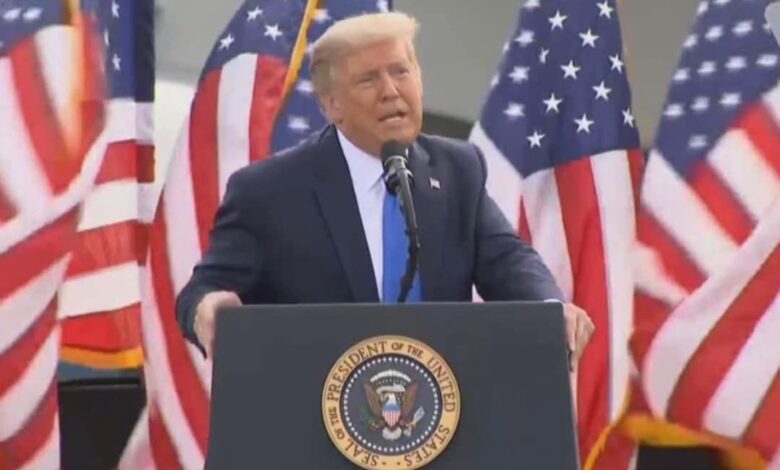Presidential Candidate Emphasizes Religious Values During Campaign Rally

Faith-Based Political Messaging Resonates with Conservative Voters
During a recent campaign event in North Carolina, presidential candidate Donald Trump delivered remarks focused on religious freedom and Christian values, drawing enthusiastic responses from attendees. The rally highlighted the ongoing intersection between faith-based messaging and political campaigns in American politics.
Campaign Strategy and Religious Outreach
The North Carolina event showcased Trump’s continued emphasis on appealing to evangelical voters through faith-centered rhetoric. Political analysts note this approach represents a significant component of conservative campaign strategy, particularly when targeting religious communities.
Trump referenced a recent incident involving Vice President Kamala Harris, where protesters at her rally had called out “Jesus is Lord.” According to Trump’s account, Harris responded by telling the group they were “at the wrong rally.” Trump used this anecdote to contrast his own approach to religious expression in political settings.
“When I hear ‘Jesus is Lord,’ I don’t hear the wrong rally,” Trump stated during his address. “I hear the right rally, the right message.” This statement generated significant audience response, with many attendees responding with religious chants.
Religious Freedom as a Campaign Theme
Throughout the event, Trump positioned himself as an advocate for religious liberty and traditional values. His remarks emphasized themes of faith, family, and constitutional freedoms – topics that consistently resonate with conservative evangelical voters.
“In this country, we respect and honor faith,” Trump declared to applause. “Our nation was built on the principles of faith, family, and freedom. And as long as I’m here, we’re going to keep it that way.”
The candidate framed religious freedom as under threat, suggesting that political opposition seeks to diminish the role of faith in American society. This messaging strategy aims to mobilize religious voters by presenting electoral participation as a defense of their beliefs.
Voter Mobilization and Political Engagement
Trump’s remarks included direct appeals for increased political participation among evangelical communities. He emphasized the importance of voter turnout in determining election outcomes, particularly among faith-based demographics.
The campaign strategy involves connecting religious conviction with civic engagement, encouraging supporters to view voting as an expression of their values. This approach reflects broader trends in American politics where religious identity intersects with political affiliation.
Electoral Strategy Analysis
Political experts observe that faith-based campaign messaging serves multiple strategic purposes:
- Base Mobilization: Energizing core conservative supporters
- Value Alignment: Connecting political positions with religious beliefs
- Community Outreach: Building relationships with influential religious leaders
- Turnout Strategy: Motivating traditionally reliable voting demographics
Campaign Events and Audience Engagement
The North Carolina rally demonstrated the effectiveness of combining political messaging with religious themes. Audience reactions, including spontaneous chanting, indicated strong resonance between the candidate’s message and attendee values.
Trump has consistently incorporated religious themes throughout his campaign appearances, including events specifically targeted at Christian audiences. This includes appearances at faith-based conferences and meetings with religious leaders.
Political Messaging and Media Coverage
The rally received significant media attention, highlighting the role of religious messaging in contemporary political campaigns. News coverage focused on both the content of Trump’s remarks and the audience response, illustrating the newsworthiness of faith-politics intersections.
Future Campaign Implications
As the campaign season progresses, religious outreach remains a key component of conservative political strategy. The North Carolina event demonstrates how candidates continue to leverage faith-based messaging to build coalition support and drive voter engagement.
Conclusion
The North Carolina rally exemplified the ongoing relationship between religious expression and political campaigning in American politics. Through targeted messaging about religious freedom and traditional values, the event showcased strategies for engaging faith-based voting communities while generating significant media coverage and public discussion.